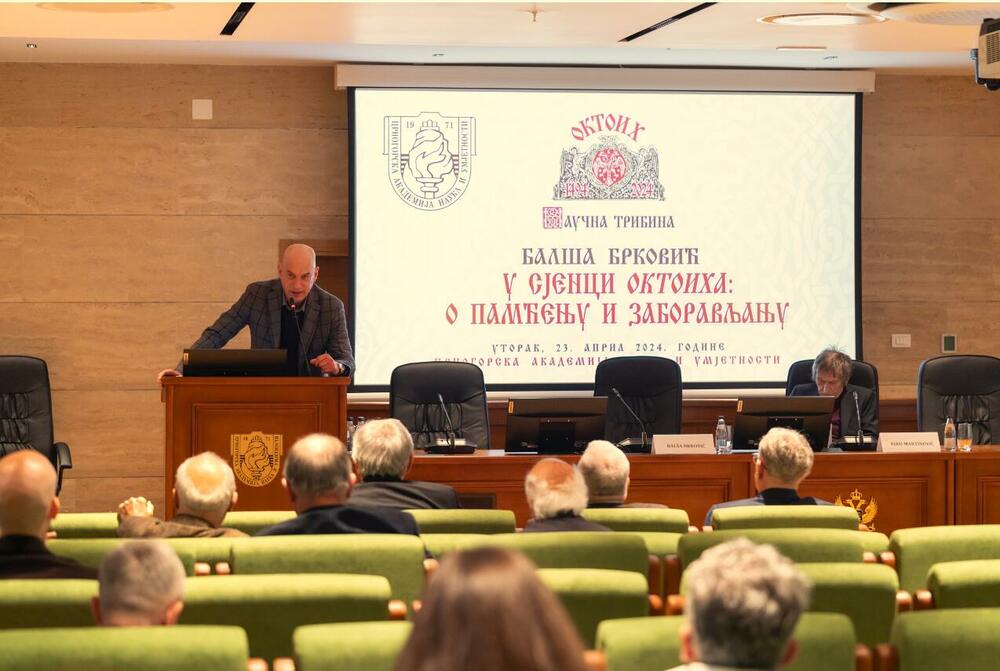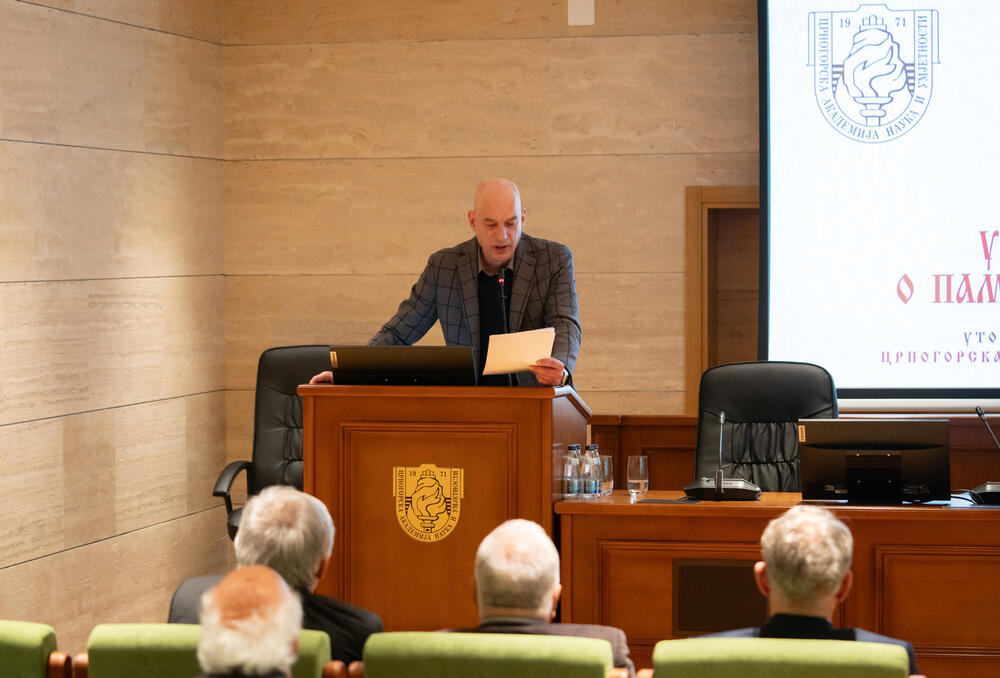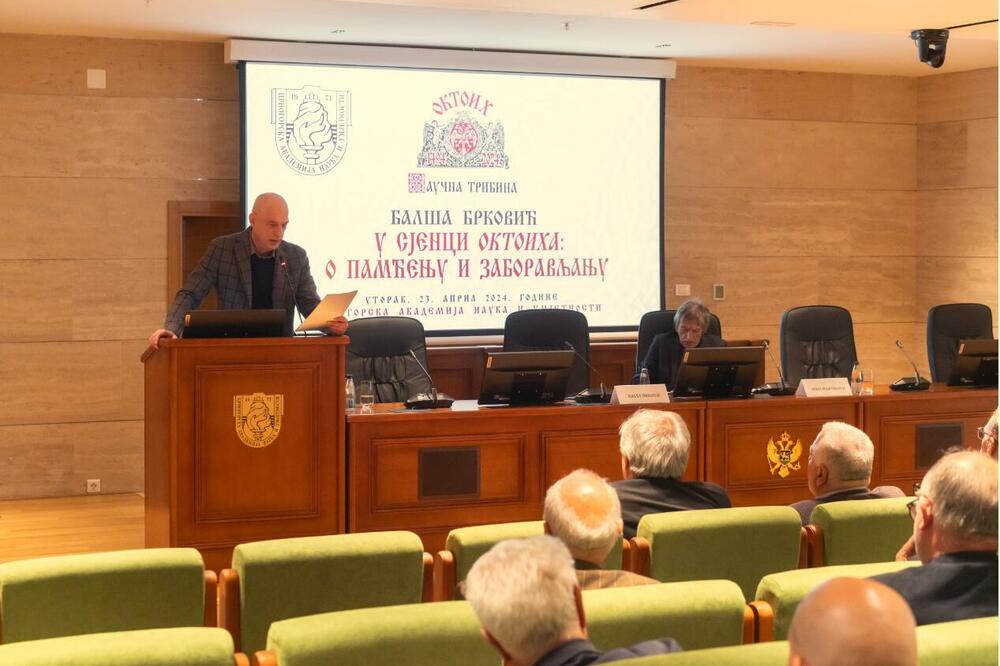The book, along with the wheel, is probably the most influential invention of mankind, he stated Balša Brković at the scientific forum on the topic "In the Shadow of Oktoich: About Memory and Forgetting", which he held yesterday at the Montenegrin Academy of Sciences and Arts (CANU) on the occasion of World Book Day.
"Since we live in a civilization created by a book, this day should be among the most important. A beautiful date was chosen that reminds us of the two biggest millennial names in European literature - Shakespeare i Cervantes", said Brković, recalling that they both died on the same day, April 23, 1616...
Speaking about the importance of the book, he pointed out that the concept of political power was fundamentally reshaped by the book.
"It is no coincidence that the invention of printing coincides with the beginning of the end of feudalism. Among other things, Gutenbergov the invention, more than any act in history, democratized knowledge and overthrew the power of isolated castles and monasteries, which jealously guarded their immeasurably valuable libraries. This was the basic prerequisite for the development and momentum of cities - feudal concepts of power were already dying out. Of course, politically, that story will continue for several hundred years, but, you should know - when you see them, things actually happened a long time ago", said Brković and added that all subsequent decisive political upheavals are unimaginable and impossible without the role of the book .

"And it's no coincidence that almost all dystopian visions of the near or distant future exclude the book, or even make it completely 'unsuitable' and politically unacceptable, precisely for all the reasons listed above for which it can be considered dangerous," the writer and columnist believes.
Book Day is a big day, for Brković, he says, the most beautiful among holidays and the most worthy of celebration.
"Because Book Day is the day of the world, the day of man and the day of freedom. All this, the world, man, freedom, was born in a book, and one day it will return to it. Into the last cosmic dust, the dust of words and signs... That great Borgesian Book of sand. That's why I believe that the Book and the City are the two most crucial concepts in the history of human civilization", says Brković and refers to Cetinje, Obod and Oktoih...
"In the case of Oktoich, that great and unexpected flash of imagination of a ruler and a semi-mythical country, we almost have a literal coincidence of the birth of the Book and the City, Obod and Cetinje".
According to Brković, the printed book initiated a series of processes, each of which was an important brick in the construction of the tower of modernity of European nations.

"First of all, the press, with its appearance, stimulated to the maximum the need of people to learn to read, as it most directly caused the process of normative standardization in almost all European languages. The momentum of new literature is also conditioned by this invention. A change in tone in literature, a change in audience: it is no longer a narrow court circle addressed by the poet, but a much wider and more diverse layer of differently curious people. A kind of broad brotherhood of spirit is developing among readers that ignores geographical limitations: reports of new worlds will soon become a literary fashion. Which was actually just the flip side of ordinary imperialism. But that is an introduction to another story", says Brković and reminds that the list of important events and processes initiated by the printed book does not end there either and repeats:
"The concept of political power was decisively reshaped by the book".
The possibility and experience of the press has promoted general polemics from one end of Europe to the other, says Brković and adds that when it comes to Montenegro, it is always emphasized, not without pride, that Crnojević's printing house is the first state printing house. This, he points out, undoubtedly points to the visionary and awareness of the cultural mission of the then ruler.
"But that fact largely determines its essence and the nature of its reach, its impact on one society and one culture in the constitution... But the fact that the Printing House on Obod was "state" means that the dynamizing moment of polemics was excluded, i.e. that an impulse that created a dialogic culture. The printing house in Obod, for understandable reasons and the effect of concrete historical reality, was directed to orthodoxy," says Brković.
He states that Montenegrin culture (chronically) lacks heretics who give birth to a dialogic experience important for every culture and adds that every anniversary of Oktoih and Crnojević's printing house is a kind of look in the mirror.
"Today it is easy to imagine what happened a long time ago: well, Đurađ Crnojević was smarter than others... But, imagine that time - printing is a novelty, almost like artificial intelligence today, or quantum computers tomorrow. Few people know anything about it in Montenegro, with the exception of the coastal cities where the press, naturally, was quickly domesticated. But the area around the lake still lives its medieval nocturne... So, at the very source of that grandiose epoch, Montenegro, this area is at the heart of the most important spiritual event. Even with elements of the "avant-garde" approach, when it comes to the "role" of the state. All this could mean that at that moment, at the beginning of that historic race, the backlog of Montenegro was minimal, if there was any. "What happened so that the following centuries were turned into a gap that convincingly separated us from the cultural flow to which we, not only by intention, but organically, actively, naturally, belonged", asks Brković.
When the history of a community begins with a printing house, he points out, and continues in the absence of books, then it is an ecstasy of forgetting - a fatal forgetting of one's own essence.
"How to return to the Book, we ask ourselves half a millennium after the Book happened here... After the Octoich and the Psalter, there will follow, in Montenegro, when it comes to books, empty centuries. It is certain that there were some books in churches and monasteries, a good part of those books were blown up in the middle of the 19th century, but that is the second chapter of the Montenegrin story of (self)forgetting. When it comes to continental Montenegro, things only change over time Petar II Petrović...", says Brković.
But the Montenegrin story in history is the story of emancipation, he assesses and says:
“The book is, how barzan he said, like a bicycle - perfect shape. And the perfect message. For all times and for all people. Therefore, let's open the windows and the books, that's the only way to see," said Brković at the scientific forum.
Authenticity and urbanity
Since entering the literary scene in the mid-eighties of the last century, Balša Brković has promoted a new literary sensibility and a clear urban articulation of his writing, academician Niko Martinović reminded in his opening address.
Balša Brković was born on April 25, 1966 in Titograd (Podgorica). He graduated from the Faculty of Philology, University of Belgrade, Department of General Literature and Literary Theory. He published six books of poetry, four novels, and his works were translated and published in the Czech Republic, Slovenia, and Albania. The story "Eyes of Enropija Plamenac" was published in the prestigious American edition "The Best European Storytellers for 2015", translated by Will Firth. A selection from Brković's poetry was published in France.
He was among the finalists, but also won numerous awards, including Miroslav's Gospel for the best book of prose in Serbia and Montenegro, as well as the Ratković Award for the best book of poetry in 2017. In 2020, the Polish translation of the poetry collection "Black Playground" was among the eight titles for the European Poet of Freedom international award, which is awarded in Gdańsk.
"Brković's poetry was recognized as authentic and self-aware from the beginning. It was represented in several national, regional and international anthology selections", said Martinović.
Bonus video:




